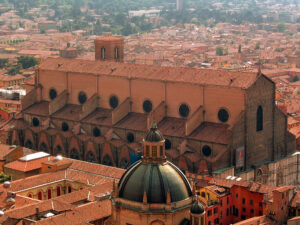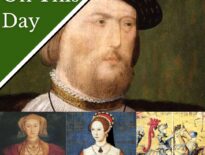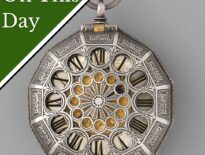
San Petronio in Bologna
Why am I talking about an Italian composer and musician?
Well, because he worked at Queen Elizabeth I’s court and is said to have been responsible for the growth of the madrigal at the royal court.
Here are some facts about this Italian composer and musician...
- Alfonso was the eldest son of singer and composer Domenico Maria Ferrabosco and his wife, Giulia.
- By 1559, when he was 16, Alfonso had entered the service of Charles of Guise, Cardinal of Lorraine.
- A record of a payment of an annual pension for the years 1562 to 1567, show him to be at Queen Elizabeth I’s court by the end of March 1562, where he held the position of a groom or gentleman of the queen’s privy chamber.
- It is not known what he played at Elizabeth I’s court, whether he sang or played the lute.
- He wasn’t permanently at the English court, he left to work for Cardinal Farnese in Rome but was forced to escape from his service in 1564 when the cardinal refused to release him so he could return to England. He was in Paris in June 1569, where he was robbed, and between October 1569 and September 1570 he was in Bologna. He may have been there acting as a spy for Elizabeth’s government.
- In 1571, Alfonso was back in England and was recorded as participating in a masque at Whitehall in June 1572, but family affairs forced him to seek permission to return to Bologna in 1574.
- In London, in 1576, he was employed to deliver the queen’s messages to diplomats from Venice and later that year he was recorded as performing in a comedy at Whitehall.
- In 1577, Alfonso was out of favour with the queen. His enemies spread rumours that he had visited the French ambassador to hear mass at his house, which Alfonso denied, stating that he had visited the ambassador many times on business, and he also had to deny robbing and murdering one of poet and courtier Sir Philip Sidney’s servants. His loss of favour led to Alfonso deciding to abandon England, but first, on 2nd May 1578, he married Susanna Symons at St Botolph’s Church in Aldgate. By this marriage, Alfonso had a son, Alfonso Ferrabosco the Younger, and a daughter, and it is thought that Susanna was their mother. These two children were left in England in the care of a friend, a court flautist.
- Alfonso and Susanna had reached Paris by mid June 1578 and then in that September, Alfonso left Susanna in Paris while he travelled on to Rome, intending for her to join him later. Unfortunately, the pope believed him to be a spy so he was arrested on his arrival in Italy. Fortunately, he was a free man by October 1580, following the intercession of Queen Elizabeth I, who had asked Catherine de’ Medici to intercede with the pope. He does not appear to have returned to England though, and his payments from Elizabeth came to an end in March 1582.
- By February 1582, Alfonso was in the service of the Duke of Savoy in Turin. In 1584, Alfonso sent for the son and daughter he’d left in England, but sadly, Elizabeth I would not give permission for them to leave.
- Alfonso died on 12th August 1588 in Bologna, leaving his wife and the two children they’d had in Italy, Carlo Emmanuele and Caterina.
- His surviving works include thirty instrumental works and 200 vocal pieces, mostly madrigals, but including some sacred music. Just a year before his death, he published two collections of madrigals. He didn’t introduce the madrigal to England, but he did popularise it.
- His son, Alfonso Ferrabosco the Younger was also a composer and musician. He went on to serve James I as an extraordinary groom of the privy chamber and taught music to Prince Henry. He wrote music for masques, collaborating with Ben Jonson, and was a gifted viol player and composer of works for the viol.
Some of Alfonso Ferrabosco’s works being performed:



Leave a Reply